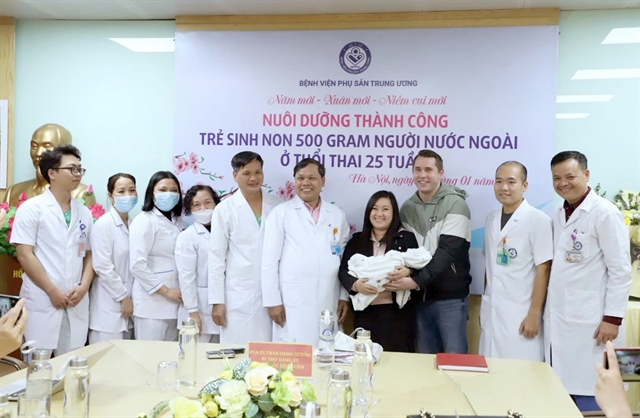 Society
Society

 |
| Bùi Ngọc Dung Jennie's family and doctors at the National Hospital of Obstetrics and Gynaecology celebrate the successful care of Dung Jennie's 500g preterm baby. — Photo courtesy of the hospital |
HÀ NỘI — Việt Nam's obstetrics field continues to make significant strides, achieving medical feats that have drastically improved neonatal survival rates.
The latest testament to these advancements came on January 3, 2023, when the National Hospital of Obstetrics and Gynaecology (NHOG) announced the successful care and nurturing of a Canadian baby boy, born prematurely at just 500g at 25 weeks and six days of gestation, Sức khoẻ & Đời sống (Health and Life) newspaper reported.
The baby suffered from intrauterine growth restriction and his mother, who had pre-eclampsia, had experienced four unsuccessful pregnancies before.
Bùi Ngọc Dung Jennie, a Canadian national, had faced multiple pregnancy complications.
Her first pregnancy ended in miscarriage at nine weeks, while the following three resulted in stillbirths between 20-22 weeks due to pre-eclampsia. Determined to ensure a better outcome this time, she returned to Việt Nam at 12 weeks for prenatal monitoring at two leading hospitals in Hà Nội.
At 24 weeks, she was transferred to NHOG due to severe pre-eclampsia, with a dire prognosis for her baby. Doctors closely monitored her in the intensive care unit, aiming to prolong the pregnancy for as long as possible to enhance the baby's chances of survival.
However, despite their efforts, the baby exhibited severe intrauterine growth restriction, malnutrition, and chronic foetal distress.
On September 30, 2022, when the mother’s condition deteriorated further, showing signs of worsening pre-eclampsia, doctors performed an emergency C-section.
The baby was born weighing just 500g, facing high risks of necrotising enterocolitis, feeding difficulties and infections.
Babies born at 26 weeks are considered extremely preterm, with high risks of severe complications such as brain haemorrhage, heart failure and cerebral palsy.
However, thanks to advances in neonatal care, an increasing number of such infants are surviving.
Typically, a 26-week-old preterm baby weighs around 760g and measures about 35cm in length so this particular infant, weighing just 500g, was incredibly fragile.
He also suffered from hypotension, leukopenia and severe intestinal ischaemia, making him highly vulnerable to infections and intestinal perforation.
Doctors immediately intubated the baby and transferred him to the Neonatal Care and Treatment Centre for ventilatory support.
Dr Phạm Hoàng Thái of NHOG said that the baby was fed breast milk from the first day, gradually increasing intake.
Initially, medical staff fed him drop by drop, just ten drops at each feeding, 16 times a day. By day 12, he was on full enteral feeding.
During his hospital stay, he received extensive respiratory support.
Associate Professor Dr Lê Minh Trác, Director of the Neonatal Care and Treatment Centre, attributed the baby's survival to refined medical strategies, including early intubation, early feeding and early massage therapy.
Massage therapy was vital, stimulating the nervous system, improving circulation and supporting respiration. It reduced apnoea, cyanosis and feeding issues, while providing nutrition through oil absorption and preventing ulcers with beneficial skin bacteria.
After more than three months of intensive care, the baby had reached 2kg in weight, was breathing independently and had developed a strong feeding reflex. He could smile and respond to massages, showing signs of comfort.
From day 76, the mother was trained in the Kangaroo Care method, and by day 97, the hospital discharged him into his family's care.
Holding her baby, the mother described the moment as a dream come true.
Preterm births are on the rise globally, with approximately 900,000 neonatal deaths annually.
For babies weighing between 1,000-1,500g, the survival rate is nearly 90 per cent, but for those under 1,000g, the rate drops to about 30 per cent.
Every additional week in the womb significantly improves a baby’s survival prospects. Successful outcomes depend on immediate resuscitation at birth and access to advanced neonatal care. In most cases, neonatal viability begins at around 24 weeks.
Professor Dr Trần Danh Cường, former Director of NHOG, said that infants born before 28 weeks fall into the 'extremely low birth weight' category and face severe complications due to underdeveloped organs, including the liver, brain and respiratory systems.
Beyond advanced medical equipment, successful care depends on strategies like early feeding and massage therapy.
Dr Cường said that this was the sixth baby weighing 400-500g successfully treated at NHOG, highlighting the hospital's expertise in managing extreme preterm cases. — VNS




